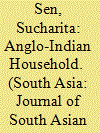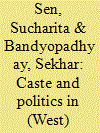| Srl | Item |
| 1 |
ID:
188404


|
|
|
|
|
| Summary/Abstract |
This article subjects the personal narratives about the domestic spaces of expatriate Britons in India, or Anglo-Indians, to close scrutiny. The households of expatriate Britons were intended to mirror the racial distance of the formal imperial spaces, like clubs, parks and gymkhanas. But far from being an extension of public spaces that separated the colonised and the coloniser, the households embodied the multiplicity of social spaces. Interpersonal relations in these households complicated this bifurcation substantially. Space played a crucial role in the construction of a hierarchy–intimacy paradox in the households, where interracial intimacies existed in tandem with imperial hierarchies.
|
|
|
|
|
|
|
|
|
|
|
|
|
|
|
|
| 2 |
ID:
193287


|
|
|
|
|
| Summary/Abstract |
Although many commentators believed that caste did not matter in West Bengal, in recent years it has emerged as a significant factor in electoral politics. The decline of the Left and the rise of the centrist-incumbent have fanned identity politics and the resurgence of caste-based political mobilisation. In this conversation, Sekhar Bandyopadhyay, a well-known expert in the history and politics of caste in Bengal, illuminates the complexities, uniqueness and dynamics of caste politics in colonial Bengal and contemporary West Bengal. The interview explores the evolution of the caste-system in colonial Bengal, its differences with the rest of India and the multiple manifestations of caste-based politics in contemporary West Bengal. Bandyopadhyay reflects on the intersection of caste with other categories of class and religion, the lower-castes’ involvement, appropriation and neglect in the political spectrum, and the future of caste and politics in West Bengal.
|
|
|
|
|
|
|
|
|
|
|
|
|
|
|
|
| 3 |
ID:
174934


|
|
|
|
|
| Summary/Abstract |
The advent of online matrimony ushered in a new era of matchmaking in the wake of globalisation. This paper aims to examine the impact of globalisation on Hindu–Bengali matrimony. The study attempts to find out the impact of online matrimony on marriages in Kolkata. On the basis of personal interviews and content analysis of advertisements in newspapers and online matrimonial websites, the study shows the impact of globalisation on the institution of marriage. The paper argues that globalisation has not made potential changes in the process of selection of prospective brides and grooms. The newspapers and online portals function as the twin matchmakers in contemporary Kolkata, with little difference from the way traditional matchmakers used to work. The paper examines the fate and impact of technology when introduced in deeply entrenched traditional social institutions. The increase in the pool of selection of mates has reinforced patriarchal ties with globalisation adjusting itself in a tradition-bound society, putting tradition and technology in a curious and cumbersome paradox.
|
|
|
|
|
|
|
|
|
|
|
|
|
|
|
|